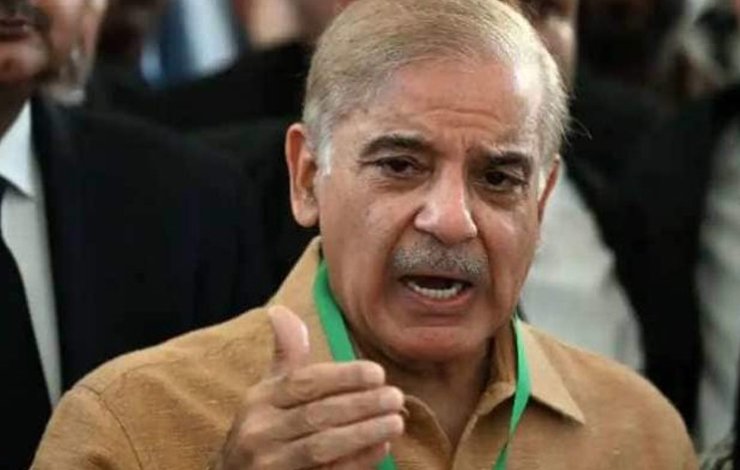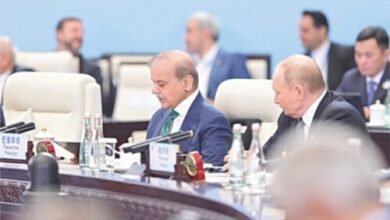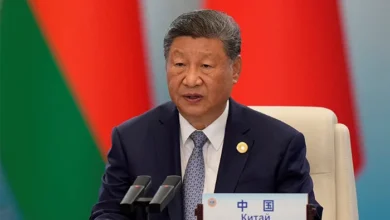SC violation: PM Shehbaz Sharif continues fiscal moves without cabinet
PM Shehbaz Sharif indulged in the violation of the SC order by continuing fiscal moves without constituting a federal cabinet.

ISLAMABAD: Prime Minister Shehbaz Sharif has indulged in the violation of the Supreme Court (SC) order by continuing fiscal moves and consultations without constituting a federal cabinet which will also be considered a violation of the Official Secrets Act.
The Pakistan Muslim League Nawaz (PML-N) government led by PM Shehbaz Sharif has failed to constitute a federal cabinet after seven days into power.
PM Sharif is said to be committing serious legal violations by holding meetings with the PML-N economic team besides issuing orders related to the economy.
It emerged that PML-N economic team members including Miftah Ismail, Ayesha Ghaus Pasha and others were given access to the official records in their meetings which is a clear violation of the Official Secrets Act as they were not part of the present government nor holding any position in the federal cabinet.
Moreover, the premier is going to inaugurate Metro Bus Service from Peshawar Morr to New Islamabad International Airport today. On this occasion, the Prime Minister will travel on Metro Bus and also address the inaugural ceremony.
PM Shehbaz Sharif fails to constitute federal cabinet after 72 hours
After assuming the office of Prime Minister, Shehbaz Sharif had directed for resumption of work on the project and its completion on a priority basis. The bus service will provide international standard travel facilities to thousands of passengers daily. Later, the Metro Bus Service will be extended to Rawat, Radio Pakistan reported.
Federal cabinet consultations
Yesterday, PML-N Punjab President Rana Sanaullah said that consultation with allied parties for the formation of a new cabinet has been completed.
While talking to a private news channel, Rana Sanaullah said PML-N would keep the ministries of Finance, Planning and Development and Information and Broadcasting while Pakistan People’s Party is interested in Foreign Ministry. He said Governor Punjab would also be from PML-N, Radio Pakistan reported.
He said the majority of ministries would be divided between PML-N and PPP while the other allied parties would be given portfolio as per their seats in National Assembly (NA).
SC judgement
In an SC verdict in August 2016, the top court had ruled that no prime minister can move any legislation, finance or fiscal bill or approve any budgetary or discretionary expenditures on his own without taking the cabinet into confidence first.
A judgement authored by Justice Mian Saqib Nisar which was announced by a three-judge bench here on Thursday stated, “The prime minister cannot take decisions by himself or by supplanting or ignoring the cabinet because the power to take decisions is vested with the federal government i.e. the cabinet and unilateral decisions taken by the prime minister would be a usurpation of power.”
The court had taken up a set of appeals against the March 9 Islamabad High Court judgement, moved by a number of Karachi-based companies namely Messers Mustafa Impex, SSS Enterprises, Fact International, Broadways, M.A. Enterprises, Bulash Enterprises, and Naveed Gaba Proprietor of “G Mobile”.
The appellants are importers of cellular phones and textile goods and filed the appeals when the federal government withdrew certain tax exemptions on the imported goods through April 4 and May 30, 2013, notifications, Dawn reported.
“It is the anti-thesis of a constitutional democracy and will amount to a reversion to a monarchical form of government reminiscent of King Louis XIV’s famous claim that ‘I am the State (literally: L’etat, c’est moi)’.
“It is most emphatically not the function of this court to surrender the hard-won liberties of the people of Pakistan to such a fanciful interpretation of the Constitution which would be destructive of all democratic principles,” the judgement emphasised, adding that any rule which enabled the prime minister to dispose of matters by bypassing the cabinet was ultra vires.
“The function of the chief executive is to execute and implement the policy decisions taken by the cabinet i.e. the federal government. The prime minister executes policy decisions, he does not take them by himself,” the judgement explained.
“The decisions of the federal government are the decisions of the cabinet and not of the prime minister and any decision taken by the prime minister on his own initiative lacks the authority of the law or the constitution,” the verdict held.
“Similarly, the prime minister is not constitutionally mandated to authorise expenditure on his own. In all cases the prior decision of the cabinet is required and that all discretionary spending without the prior approval of the cabinet, are contrary to law.”
The court also made it clear that an ex post facto approval by the cabinet would not suffice since money once spent could not be unspent. Thus an attempt to confront the court with a fait accompli by contending that since the money had already been spent it should be regularised is unacceptable, the judgement said.
The court concluded that the Rules of Business, 1973, are binding on the government and a failure to follow them would lead to an order lacking any legal validity.
Likewise, the federal government is the collective entity described as the cabinet constituting the prime minister and federal ministers, the verdict explained, adding that neither a secretary, nor a minister or the prime minister was the federal government.
The exercise of a statutory power exercisable by the federal government by any of them, especially in relation to fiscal matters, is constitutionally invalid and a nullity in the eyes of the law.
Similarly, budgetary expenditures or discretionary governmental expenditures could only be authorised by the federal government i.e. the cabinet and not the prime minister himself, the judgement said.
“Likewise, an ordinance making power can only be exercised after a prior consideration by the cabinet and any ordinance issued without the prior approval of the cabinet is not valid.
“No bill can be moved in the parliament on behalf of the federal government without having been approved in advance by the cabinet. The cabinet has to be given a reasonable opportunity to consider, deliberate on and take decisions in relation to all proposed legislation, including the finance bill, or ordinance or act,” the judgement said.



